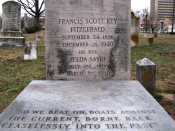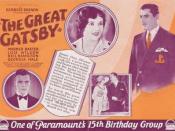Imagine a well written tale infused with philosophical ideas and you have F. Scott Fitzgerald's work, "The Great Gatsby". The ancient Greeks drew upon the epics "Homer" and the "Iliad" to emphasize certain moral attributes and ideas. Fitzgerald brings to us, in the same spirit as Homer, a story that leaves a lasting impression on society. American tradition, culture, and values are the underlying objects of analysis in this novel. Fitzgerald's focus on American life in the 1920s brings forth a critique of the "American Dream" as described by Nick Carraway, morals, and society itself. "The Great Gatsby" is a contribution to the American understanding of right and wrong and goals. Fitzgerald gives a truly inventive and interesting foundation on which to view American culture. In describing the effects of "The Great Gatsby" we shall take a look a brief look at the plot and themes and apply them to the contributions that Fitzgerald has given our society.
"The Great Gatsby" is about the lavish expenditures and lifestyles of the rich during the 1920s. Its plot involves Jay Gatsby's dream of Daisy and his desperate means of garnering her love, which is not worthy of Gatsby's affection. It is in the illegal activities and parties that Gatsby uses to attract Daisy's attention that a story develops. Nick Carraway, a quiet and mostly objective observer, describes to us the story of Jay Gatsby. He presents to us in sad tone of what American society can become and the vital principles it can lose through Gatsby. This is Fitzgerald's most important contribution to our culture. The American Dream of happiness and individualism is shattered by greed and the loss of virtue amongst the people ("The Great Gatsby", Phillips).
Through Fitzgerald's story, the culture of the 1920s can be looked...


